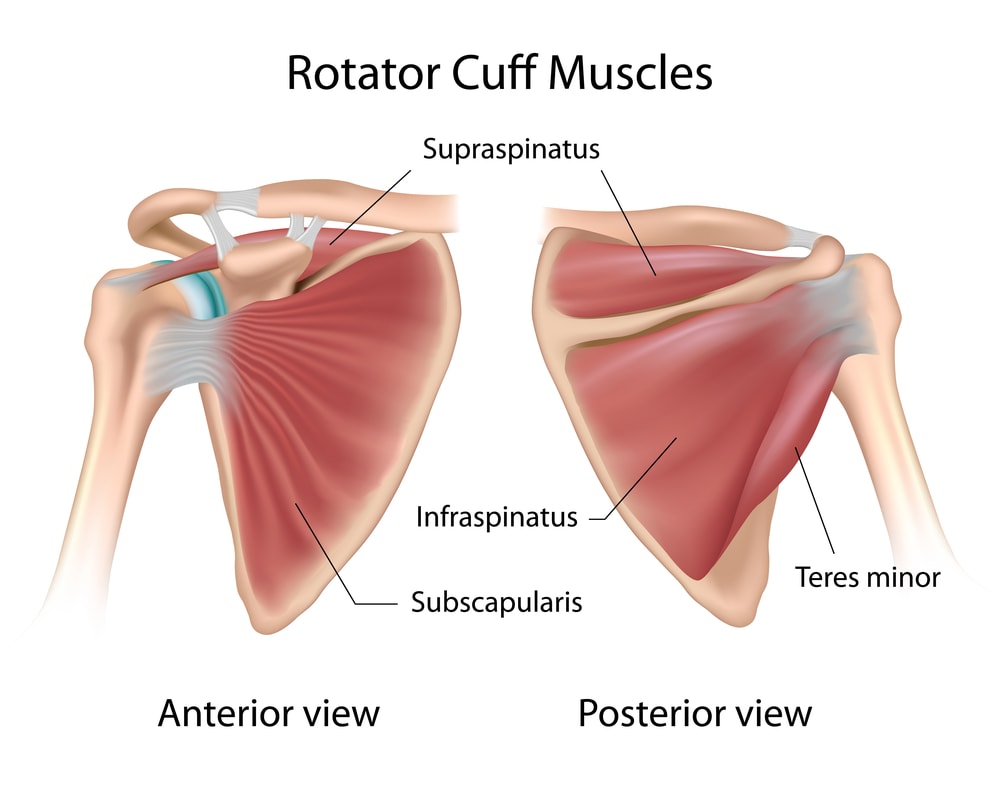Shoulder Pain: How Often Are Rotator Cuff Tears Asymptomatic?
 |
| Credit: Shutterstock |
The Rotator Cuff
Your shoulder has muscles and tendons that surround the shoulder joint called the rotator cuff. These are the supraspinatus, infraspinatus, subscapularis, and teres minor. These muscles help to move and stabilize your shoulder. These tendons can be torn, and that injury is called a rotator cuff tear.These tears happen more often in older patients, usually in their 50s-70s. Tears can occur with trauma or just happen because of wear and tear. The pain is generally felt in the shoulder, and using that joint causes pain.
A Common Scenario
A reasonable question to ask is whether that rotator cuff tear was there before the symptoms started, and hence it has nothing to do with why the shoulder hurts. Meaning the diagnosis that the rotator cuff tear is causing the patient’s pain is inaccurate. Let’s review a recent study to determine how frequent asymptomatic rotator cuff tears are in people walking around without shoulder pain.
The Research
This blog began because I happened on a 2013 study performed in Japan. Researchers performed ultrasound examinations on 664 patients in a small village as part of a health check-up. 22% of the patients had full-thickness rotator cuff tears, and this prevalence increased with age:- 20s-40s-0%
- 50s-11%
- 60s-15%
- 70s-27%
- 80s-37%
A 2018 California study showed that of 23 little league baseball players who reported no shoulder problems, 52% of the players had MRI findings that weren’t present in the non-dominant shoulder (2). These findings included partial rotator cuff tears, bursal swelling, labral tears, and bone cysts. A 2016 study performed in Florida looked at 53 patients who were middle-aged with no shoulder problems and found 55-72% of the group had labral tears (the lip around the shoulder socket) (3). Another baseball study of draft picks used high-field 3T MRI and imaged 19 players with no shoulder pain (4). 68%, 32%, and 21% of the players showed tendinopathy, partial-thickness rotator cuff tears, and AC joint arthritis.
Maybe these MRIs are just catching these patients before they show symptoms? A 2013 study of 50 patients in Norway found that 32% of these asymptomatic patients developed symptoms during a 3-year follow-up (5). However, we need to be careful here as these patients knew they were being followed in a shoulder study. Meaning, this may have biased the results.
Are specific characteristics on the MRI more often associated with painful tears? Yes, it seems like fatty degeneration of the rotator cuff muscles and larger tear size (over an inch or 3 cm) are more commonly associated with being symptomatic (6). However, this is a single small study.
__________________________________________________
References:
(1) Minagawa H, Yamamoto N, Abe H, et al. Prevalence of symptomatic and asymptomatic rotator cuff tears in the general population: From mass-screening in one village. J Orthop. 2013;10(1):8-12. Published 2013 Feb 26. doi:10.1016/j.jor.2013.01.008
(2) Pennock AT, Dwek J, Levy E, Stearns P, Manning J, Dennis MM, Davis-Juarez A, Bastrom T, Taylor KS. Shoulder MRI Abnormalities in Asymptomatic Little League Baseball Players. Orthop J Sports Med. 2018 Feb 23;6(2):2325967118756825. doi: 10.1177/2325967118756825. PMID: 29511703; PMCID: PMC5826014.
(3) Schwartzberg R, Reuss BL, Burkhart BG, Butterfield M, Wu JY, McLean KW. High Prevalence of Superior Labral Tears Diagnosed by MRI in Middle-Aged Patients With Asymptomatic Shoulders. Orthop J Sports Med. 2016 Jan 5;4(1):2325967115623212. doi: 10.1177/2325967115623212. PMID: 26779556; PMCID: PMC4710128.
(4) Del Grande F, Aro M, Jalali Farahani S, Cosgarea A, Wilckens J, Carrino JA. High-Resolution 3-T Magnetic Resonance Imaging of the Shoulder in Nonsymptomatic Professional Baseball Pitcher Draft Picks. J Comput Assist Tomogr. 2016 Jan-Feb;40(1):118-25. doi: 10.1097/RCT.0000000000000327. PMID: 26529676.
(5) Moosmayer S, Tariq R, Stiris M, Smith HJ. The natural history of asymptomatic rotator cuff tears: a three-year follow-up of fifty cases. J Bone Joint Surg Am. 2013 Jul 17;95(14):1249-55. doi: 10.2106/JBJS.L.00185. PMID: 23864172.
(6) Moosmayer S, Tariq R, Stiris MG, Smith HJ. MRI of symptomatic and asymptomatic full-thickness rotator cuff tears. A comparison of findings in 100 subjects. Acta Orthop. 2010;81(3):361-366. doi:10.3109/17453674.2010.483993
Source: https://regenexx.com/blog/how-often-are-rotator-cuff-tears-asymptomatic/
.png)

.png)






Comments
Post a Comment